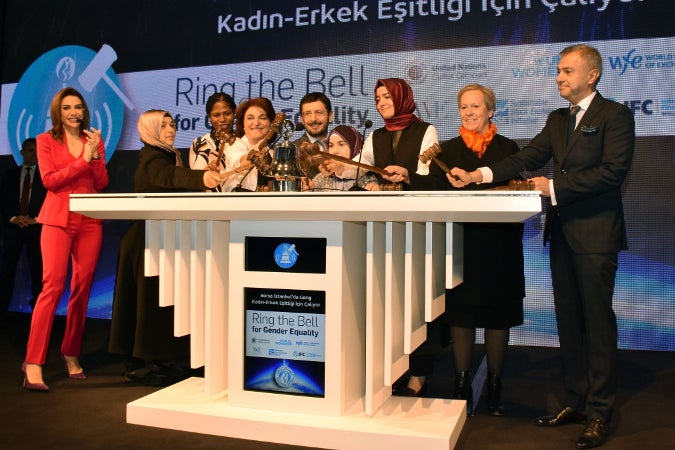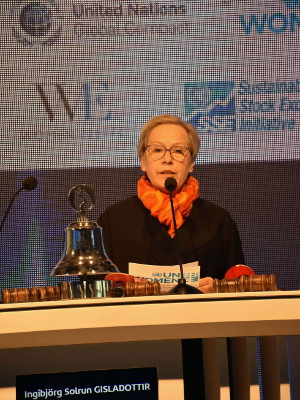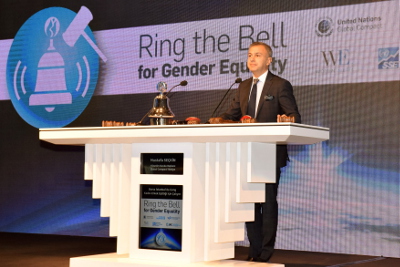Borsa Istanbul rings bell for gender equality
UN Women says unpaid care and domestic work and unfair barrier to equal labour force participation and pay are the biggest obstacles to Turkish women’s full economic participation as Istanbul Stock Exchange rings bell for gender equality on International Women’s Day.
Date:

Borsa Istanbul was one of 40 stock exchanges that hosted bell-ringing ceremonies in support of women in the business world during the lead-up to International Women’s Day on 8 March. Stock exchanges around the world rang out a loud and clear message about the importance of gender equality and women’s economic empowerment.
“I hope that the whole world, from the East to the West, hears this sound. Let this sound be the voice of woman entrepreneurs, women workers. Let it be the voice of labour and justice,” said Turkey’s Minister of Family And Social Policies, Dr Fatma Betül Sayan Kaya, as the bell rang on the Borsa Istanbul floor.
She noted that Turkey’s target is to increase women’s employment rate to 41 per cent by the centenary of the Republic of Turkey in 2023, from its current 33 per cent.

“Turkish women perform the longest hours of unpaid care work in the OECD,” said UN Women Regional Director For Europe And Central Asia and Representative to Turkey Ms. Ingibjörg Solrun Gísladóttir. “Consequently, Turkish women’s labour force participation rate is Europe’s lowest.”
“The unpaid care work burden Is perhaps the biggest obstacle to Turkish women’s participation in the economy as paid workers with secure, productive employment,” Ms. Gísladóttir added.
A founding member of the sustainable stock exchanges initiative, Borsa İstanbul has hosted the bell-ringing ceremony on International Women’s Day for the past two years. “Ring the Bell for Equality” events have taken place around the world through joint efforts by UN Women, the UN Global Compact, the World Federation Of Exchanges, Women in Exchange Traded Funds, the Sustainable Stock Exchanges Initiative, and the International Finance Corporation (IFC).
“A country cannot develop without equal opportunities,” said Himmet Karadağ, Chairperson of the Borsa İstanbul Board and Executive Committee, and host of the opening-bell ceremony.
IFC Turkey Director, Aisha Williams concurred, noting: “Globally, companies with gender diversity perform better in corporate governance and are generally more competitive and innovative.”

Since March 2016, 74 new companies in Turkey have become signatories of the Women Empowerment Principles (WEPs), a joint initiative of UN Women and the UN Global Compact, in which signatory companies commit to seven Principles to promote gender equality from the boardroom to the workplace, and from the supply chain to society. With more than 1200 signatories from around the world, the WEPs have 150 signatories from Turkey today. Turkey is the second country in the world with the highest number of WEPs signatories.
“Ensuring that women play a larger role in every part of society and every phase of working life means a fairer and more sustainable development and stronger economy," said Mr. Mustafa Seçkin, Global Compact Türkiye Chairperson, who was followed as a speaker by SUTEKS Group CEO and WEPs Business Advocate Nur Ger.
Stakeholders, suppliers and distributors develop inclusion strategies as part of their support to the WEPs. The WEPs seek to:
- Establish high-level corporate leadership for gender equality
- Treat all women and men fairly at work, and respect and support human rights and non-discrimination
- Ensure the health, safety and well-being of all female and male workers
- Promote education, training and professional development for women
- Implement enterprise development, supply chain and marketing practices that empower women
- Promote equality through community initiatives and advocacy
- Measure and publicly report on progres